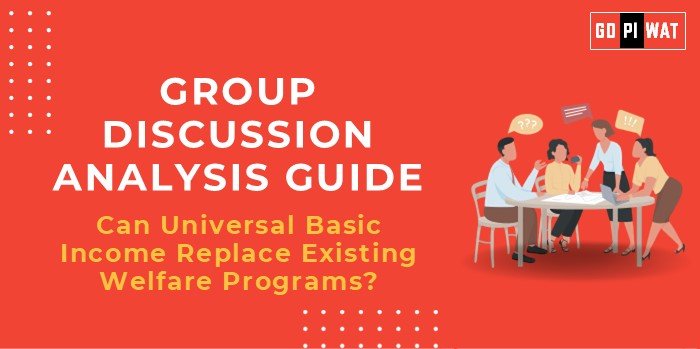📋 Group Discussion (GD) Analysis Guide
🌐 Topic: Can Universal Basic Income Replace Existing Welfare Programs?
📄 Introduction to the Topic
Opening Context: Universal Basic Income (UBI) has emerged as a global policy discussion point, particularly after the economic disruptions caused by the pandemic. Its feasibility in replacing existing welfare systems is being debated worldwide, as governments seek efficient ways to address inequality and poverty.
Topic Background: UBI refers to a guaranteed periodic payment provided to all citizens regardless of income, employment status, or wealth. While the idea dates back to the 16th century, it has gained traction in recent years, with pilot programs in Finland, Canada, and India offering insights into its potential impact.
📊 Quick Facts and Key Statistics
- Pilot Programs: Finland (2017–2018) – Improved happiness and reduced stress among recipients but no significant employment effect.
- Cost Estimates: Implementing UBI in India could cost approximately 4.5% of GDP annually (Economic Survey 2016-17).
- Poverty Alleviation: UBI could lift 50% of Indians out of poverty with effective implementation (UNDP, 2022).
- Administrative Efficiency: 90% of welfare funds in India reach intended beneficiaries, but leakages persist.
🤝 Stakeholders and Their Roles
- Government: Policy formulation, implementation, funding allocations, and pilot evaluations.
- Private Sector: Supporting technology and logistics for disbursement mechanisms.
- Citizens: Beneficiaries, particularly marginalized communities.
- NGOs & Think Tanks: Providing research and monitoring impacts of UBI implementation.
🏆 Achievements and Challenges
🌟 Achievements:
- Increased Livelihood Security: UBI can provide stable income, reducing poverty.
- Administrative Simplification: Replaces multiple overlapping welfare programs, reducing bureaucratic inefficiency.
- Social Equality: Ensures a basic income floor, potentially reducing wealth disparity.
⚠️ Challenges:
- High Costs: Financing UBI could lead to increased taxes or reduced spending in other sectors.
- Dependency Risk: Potentially discourages workforce participation.
- Inadequate Targeting: Uniform distribution may neglect the specific needs of vulnerable groups.
🌍 Global Comparisons
- Success: Alaska’s Permanent Fund Dividend has distributed annual payments to residents since 1982, funded by oil revenues.
- Challenge: Finland’s UBI pilot revealed limited impact on employment but improved well-being.
📚 Structured Arguments for Discussion
- Supporting Stance: “UBI ensures a dignified life for all by reducing poverty and streamlining welfare systems.”
- Opposing Stance: “UBI is economically unfeasible for developing countries and risks disincentivizing work.”
- Balanced Perspective: “UBI could complement existing welfare systems rather than fully replacing them, balancing universal coverage with targeted aid.”
📈 Effective Discussion Approaches
- Opening Approaches:
- Data Impact: “Replacing India’s welfare schemes with UBI could reduce administrative costs but would require 4.5% of GDP annually.”
- Historical Context: “The concept of UBI dates back centuries but remains untested at scale in developing nations.”
- Comparative Case: “Alaska’s UBI model highlights the importance of sustainable funding sources.”
- Counter-Argument Handling:
- Dependency risk can be mitigated by combining UBI with job guarantees.
- Funding challenges are solvable through economic growth and innovative taxation models.
🔍 Strategic Analysis of Strengths and Weaknesses
- Strengths: Poverty reduction, administrative efficiency, social equality.
- Weaknesses: High costs, risk of misuse, lack of targeting.
- Opportunities: Funding through resource taxation, AI-led job disruptions.
- Threats: Political resistance, economic instability, inflation risks.
💼 Connecting with B-School Applications
- Real-World Applications: UBI as a case study in social finance, operational logistics, and public policy.
- Sample Interview Questions:
- “How can UBI be sustainably funded in a developing economy?”
- “What lessons can India draw from global UBI experiments?”
- Insights for Students: Research on fiscal impacts, technology-enabled implementation, and policy innovation.


